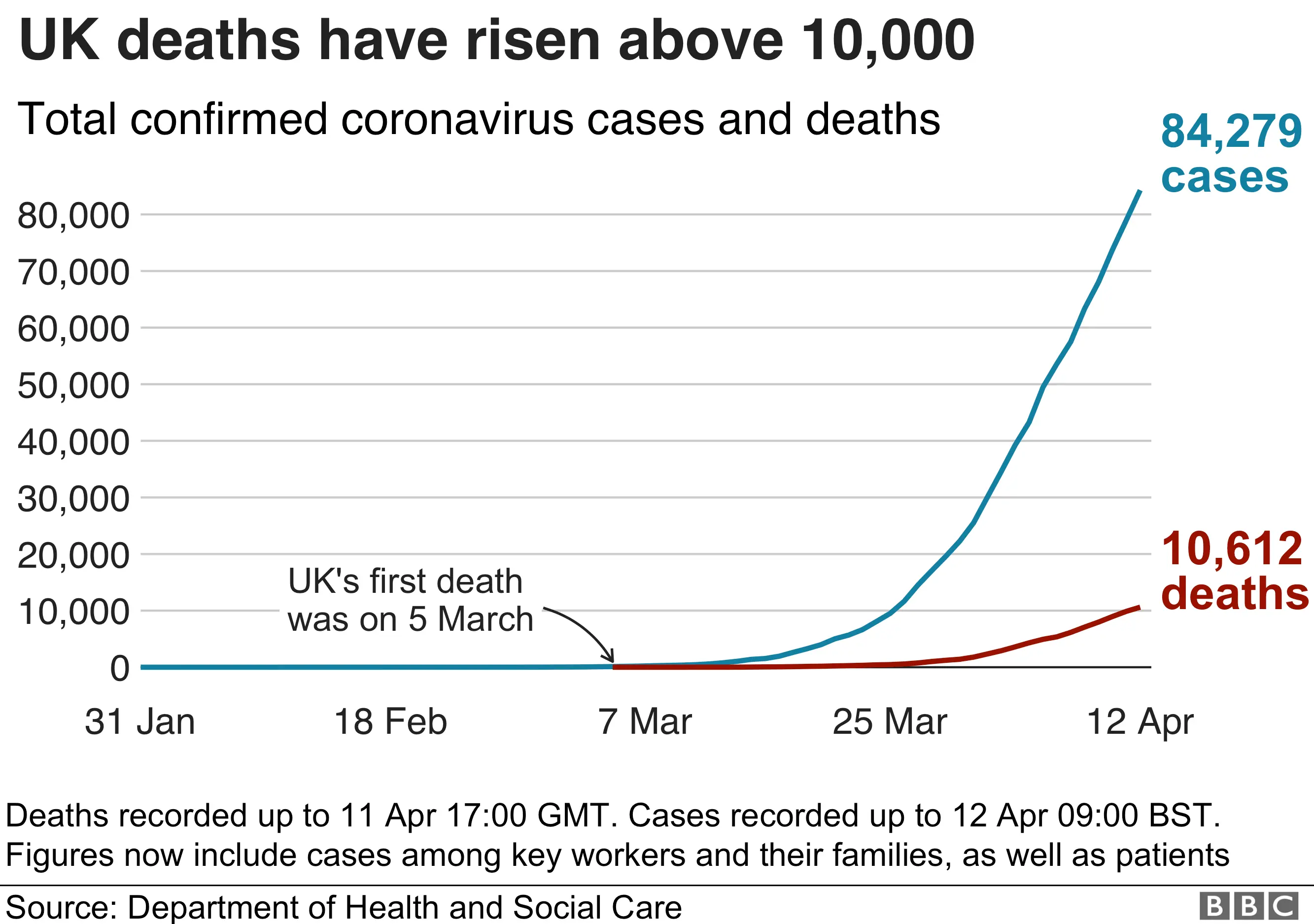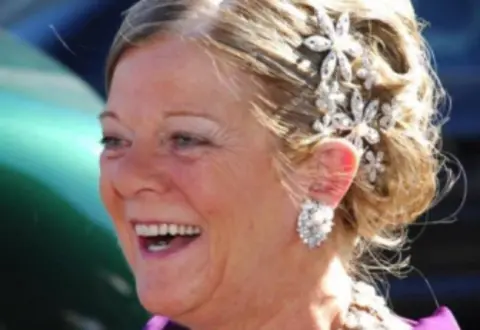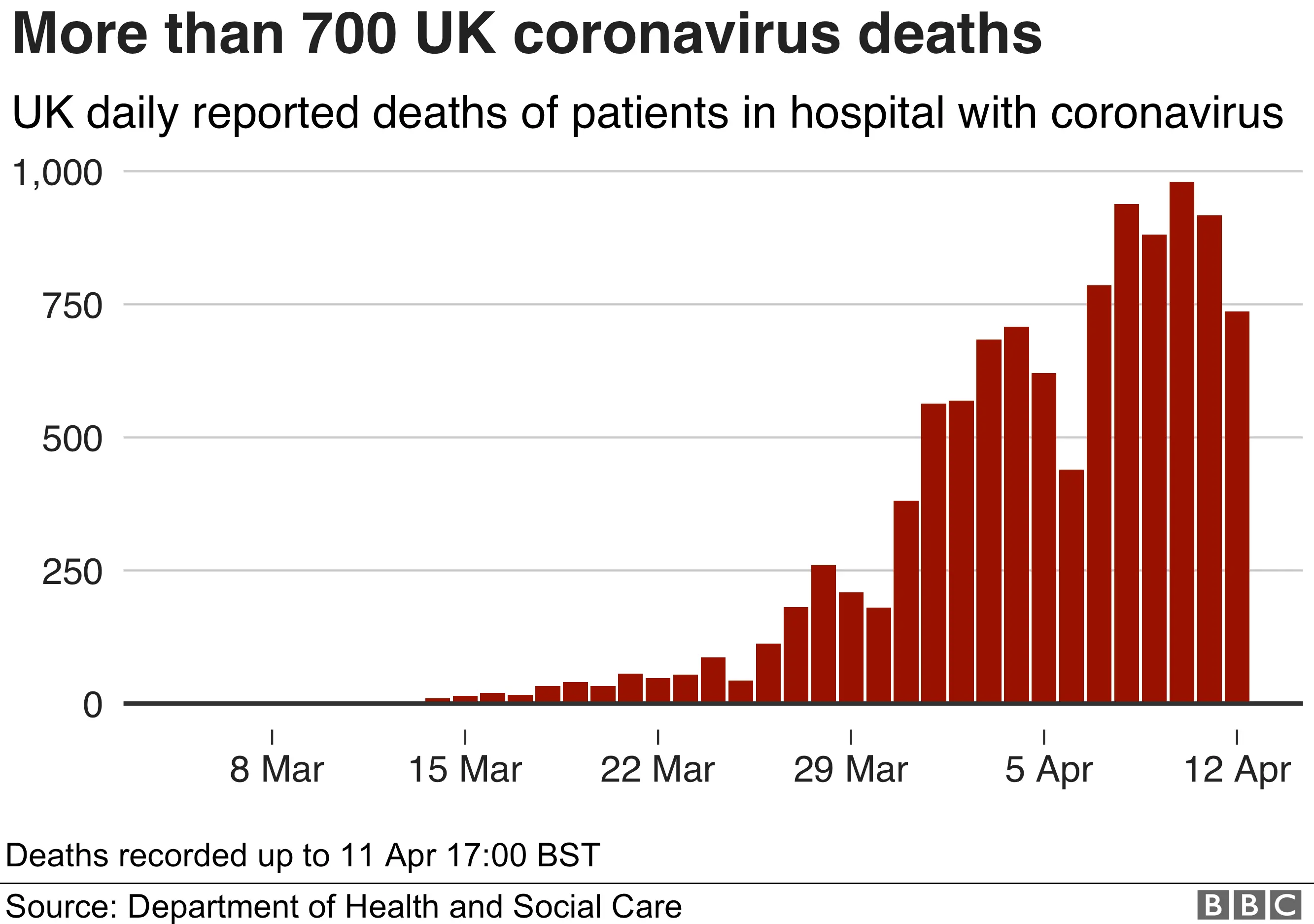Coronavirus: 'Sombre day' as UK deaths hit 10,000
The UK has recorded 737 new coronavirus-related hospital deaths, taking the total number to 10,612.
It comes after one of the government's senior scientific advisers said the UK was likely to be among the worst-affected European countries.
Health Secretary Matt Hancock said "today marks a sombre day", but welcomed the efforts people had made to stay at home.
The number of reported deaths does not include deaths outside of hospitals.
Meanwhile, Boris Johnson thanked healthcare workers for saving his life after being discharged from hospital.
Mr Hancock told the daily press briefing: "Today marks a sombre day in the impact of this disease as we join the list of countries who have seen more than 10,000 deaths related to coronavirus.
"The fact that over 10,000 people have now lost their lives to this invisible killer demonstrates just how serious this coronavirus is and why the national effort that everyone is engaged in is so important."
The UK is the fifth country to surpass 10,000 deaths, joining the US, Spain, Italy and France.
Earlier, Sir Jeremy Farrar, a member of the government's Scientific Advisory Group for Emergencies (Sage), said the UK was likely to be "one of the worst, if not the worst affected country in Europe".
In comparison, he said, the "remarkable" scale of testing in Germany had been key to keeping the number of hospital admissions for coronavirus lower than in the UK.
"Undoubtedly there are lessons to learn from that," he said.
Responding to Sir Jeremy's comments, the health secretary said: "The future of this virus is unknowable as yet because it depends on the behaviour of millions of people and the great British public."
Mr Hancock added that the government took advice from experts "very seriously".

Public Health England medical director Professor Yvonne Doyle said the number of people in hospital with coronavirus in London was stabilising, but it was increasing in north-west England, Yorkshire and north-east England.
Speaking about the loved ones of those who had died, Mr Hancock said: "Their grief is our grief and their stories will not be forgotten."

'Mum was there for me no matter what'

Janice Graham, 58, was the first NHS worker in Scotland to die from coronavirus. Her son said he would miss "everything about her".

The health secretary also congratulated the British public for "rising to this challenge" of staying at home.
"Your steadfast commitment to following these social distancing rules is making a difference," he added.
Ministers are continuing to urge people to stay at home over the Easter weekend to curb the spread of the virus, despite warm and sunny weather across parts of the UK.



Today's fall in the number of newly announced deaths of people with coronavirus is of little comfort as we pass the tragic milestone of 10,000.
And we know that the true death toll to date is higher: this figure doesn't include people who have died with coronavirus but whose death has not yet been reported to the Department for Health.
But it could have been worse.
Up until last weekend, this figure was doubling every three and a half days. Had that continued, we might have seen more than 2,500 deaths announced today. That growth has not happened.
Today's fall could be attributed to less reporting of deaths over a bank holiday. Even if we have not turned the corner, the number of deaths announced each day has held below 1,000 throughout the week.
That is still a terrifying figure. But the slowdown in the growth of new cases, of people hospitalised with coronavirus and in deaths all add to the evidence that the lockdown is working.


- A SIMPLE GUIDE: How do I protect myself?
- HOPE AND LOSS: Your coronavirus stories
- LOOK-UP TOOL: Check cases in your area
- STRESS: How to look after your mental health

The health secretary also announced plans for an NHS app that will warn users if they have recently been in close proximity to someone suspected of having been infected by the coronavirus.
Mr Hancock also addressed ongoing criticism over the lack of personal protective equipment (PPE) for NHS staff.
He denied that the government had been too slow to stockpile PPE and said supplies had been "significant", but acknowledged there was "always more to be done".
There were now "record amounts in the system", he added.
Mr Hancock said there was more spare capacity for critical care than there was when coronavirus "first hit our shores".
As of Sunday, there were 2,295 spare critical care beds across Great Britain, up by 150 from Saturday, he said.
In other developments:
- Parliament might be able to return virtually on 21 April to debate coronavirus measures, authorise spending and make laws.
- "More money needs to go out faster" to businesses applying for emergency loans, the government has admitted.
- A "close-knit" care home near Bristol has lost "a significant number" of its residents to Covid-19.
- Some key medicines used in intensive care are "in relatively short supply", the BBC understands.
- Children in Edinburgh have been coming up with ingenious ways to keep the tradition of rolling Easter eggs.
- The US has now overtaken Italy to have the highest death toll from coronavirus in the world. The latest data, compiled by Johns Hopkins University, shows more than 20,000 people in the US have died.
- Comedian Tim Brooke-Taylor, best known for The Goodies and I'm Sorry I Haven't A Clue, has died aged 79 with coronavirus.
